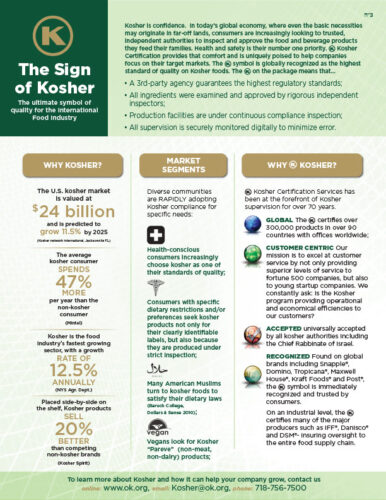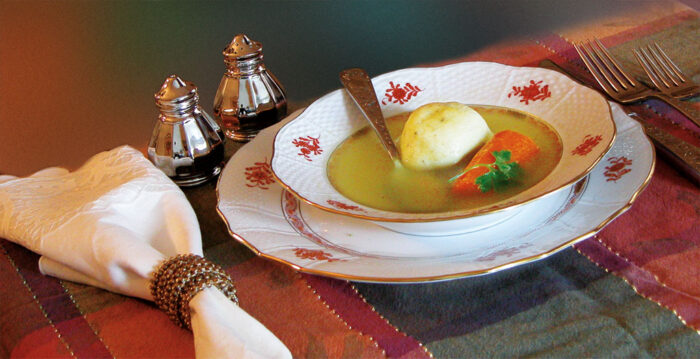Food has an effect on the eater’s soul, no matter when or where it is eaten. Thus it is as important to eat only kosher food when visiting, dining out, vacationing or traveling, as it is when eating kosher at home. Acquaintances and friends may sometimes wonder at our unwillingness to eat in all restaurants, but most people will respect us for upholding our principles.
Restaurants, Caterers and Hotels
When food is prepared in large quantities by a large kitchen staff, the difficulty of maintaining high standards of kashrut is greatly amplified. Add to this the pressure of commercial considerations and culinary integrity, and the need for kosher supervision becomes readily apparent. A mashgiach (kosher overseer) is essential to restaurant orthodox kosher compliance and may be required to be on the premises at all times.
Before dining out, find out who is responsible for the kosher supervision of the premises. Trustworthy kosher establishments are always willing to answer your questions about the kosher certification of their restaurant or service.
Things to notice, things to ask
The mashgiach must be present to check all products brought into the establishment, and must also be present during the preparation of the food.
If the establishment is a hotel, or a restaurant kept open for the purpose of serving holiday meals, the reservations and payment must be made before the Shabbat or holiday begins.
Meat Restaurants: Meat restaurants require proper kosher supervision.
All laws pertaining to kosher meat, including ritual slaughtering, permissible cuts, salting, deveining and separation from dairy must be strictly observed.
Incoming food deliveries must be strictly supervised in order to prevent the use of foods which are non-kosher or dairy. Further, personnel involved in handling the food may not be fully aware of the special requirements of kosher meat, and require careful monitoring. Additionally, most meat restaurants also serve fish which, has its own special kosher requirements and may not be mixed with meat. A reliable full-time kosher overseer is a necessity.
Vegetarian and Dairy Restaurants: Some people incorrectly assume that a restaurant is kosher if it does not serve meat. In truth, however, a dairy or vegetarian restaurant can have any number of reasons to be considered not kosher. Here are 3 examples of possible problems in a vegetarian or dairy restaurant:
- Non-kosher fish or seafood will render the pots, dishes, dishwashers, etc. non-kosher, and foods prepared in such utensils may not be eaten.
- All pareve and dairy ingredients must also be kosher in order to maintain the kosher status of utensils and all other foods. For example, all oil or shortening used must be made of pure vegetable products and be kosher certified.
- Certain vegetables and grains must be carefully washed and checked for insects and worms. Eggs must be inspected for blood spots.
- Food which is not usually eaten raw, and which was prepared for consumption entirely by a non-Jew, is not permitted even if cooked in kosher utensils. Such food is called bishul akum. If a Jew assists, such as by lighting the flame used for cooking, the food is not considered bishul akum and may be eaten.
Pre-Packaged Kosher Meals
Airlines: Most airlines will readily arrange, upon request, a pre-packaged kosher meal at no extra cost. When making your reservation, be sure the kosher meal has a reliable orthodox kosher certification. The food must be brought to you complete with its wrappers still sealed. It may not be warmed in the airplane’s oven once the original wrapper is removed, and may not be handled with non-kosher utensils.
Experienced kosher travelers find it helpful to call the airline the day before the flight to confirm their request for a kosher meal. Even with these precautions, it is advisable to pack some carry-on snack food just in case.
Hospitals: Most hospitals have available, or are willing to obtain, pre-packaged kosher meals like the ones served by airlines. Again, the food must be warmed in its original wrapper and be brought to you still sealed. The nursing staff will often be quite helpful and may allow you to keep some food in the refrigerator. This food should be clearly marked and sealed.
Some hospitals even have kosher kitchens, which may be used once you have ensured that there is reliable orthodox kosher supervision. Often a kosher overseer is available on the premises and will be ready to answer your questions.


 EN
EN  ZH
ZH  KR
KR  BR
BR  ES
ES  IN
IN  IL
IL 




